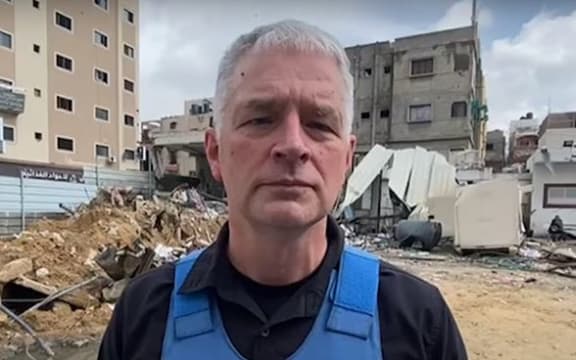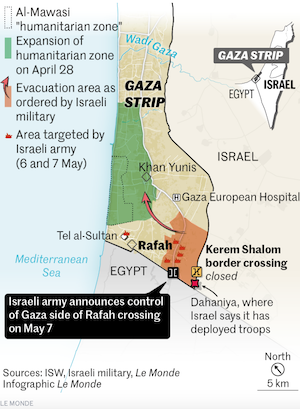As Israel presses ahead with strikes in Rafah and seizing the Rafah crossing from Egypt, aid agencies are sounding the alarm of a “catastrophic humanitarian situation”.
Rafah was “significant” because it was the only part in Gaza that had not been terribly damaged by the conflict, United Nations Relief and Works Agency for Palestine Refugees (UNRWA) senior deputy director Scott Anderson told RNZ Checkpoint.
“Most of the infrastructure is intact,” he said.
“And most importantly, we have 1.4 million of the 2.2 million people in Gaza sheltering here in Rafah. And of that number, more than half are children,” Anderson told Checkpoint.
“It’s the last place of safety within Gaza.”

He said people struggled daily to find food, water, showers and toilets.
Palestinians have now been ordered to evacuate parts of Rafah as Israel prepares for a long-threatened assault on Hamas holdouts in the city.
People displaced five times
Many of the people had already been displaced five or six times, Anderson said.
“And now come the evacuation orders and it makes people very nervous and apprehensive.
“For us it is a concern because Rafah is also where our main supply line for Gaza exists through Kerem Shalom from Israel, or through Rafah Gate from Egypt.”
He said it would affect aid reaching Rafah.

In the north of Gaza, only 30 to 50 trucks could enter a day, whereas Kerem Shalom in the south could accommodate up to 600 trucks.
The Rafah terminal from Egypt was a path for fuel and diesel to come in.
“If we don’t have diesel, we don’t have hospitals running, we don’t have food being delivered, water is not being produced, waste isn’t being picked up, and the sewers aren’t running.
“So those two crossings very much are the lifeline of Gaza, and without those, it could become very much a catastrophic humanitarian situation beyond what already exists.”
Palestinian militant group Hamas has agreed to a Gaza ceasefire proposal from mediators, but Israel said the terms did not meet its demands.
This article is republished under a community partnership agreement with RNZ.
Article by AsiaPacificReport.nz







